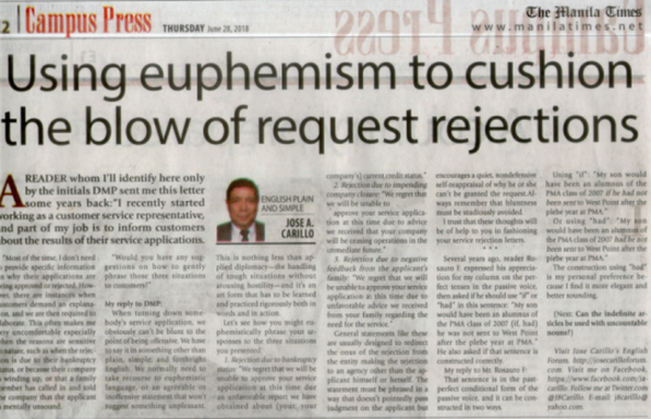A reader whom I’ll identify here only by the initials DMP sent me this letter some years back: “I recently started working as a customer service representative, and part of my job is to inform customers about the results of their service applications.
“Most of the time, I don’t need to provide specific information on why their applications are being approved or rejected. However, there are instances when customers demand an explanation, and we are then required to elaborate. This often makes me very uncomfortable especially when the reasons are sensitive in nature, such as when the rejection is due to their bankruptcy status, or because their company is winding up, or that a family member has called in and told the company that the applicant is mentally unsound.
“Would you have any suggestions on how to gently phrase those three situations to customers?”
My reply to DMP:
When turning down somebody’s service application, we obviously can’t be blunt to the point of being offensive. We have to say it in something other than plain, simple, and forthright English. We normally need to take recourse to
euphemistic language, or an agreeable or inoffensive statement that won’t suggest something unpleasant. This is nothing less than applied diplomacy—the handling of tough situations without arousing hostility—and it’s an art form that has to be learned and practiced rigorously both in words and in action.
Let’s see how you might euphemistically phrase your responses to the three situations you presented:
1. Rejection due to bankruptcy status: “We regret that we will be unable to approve your service application at this time due an unfavorable report we have obtained about (your, your company’s) current credit status.”
2. Rejection due to impending company closure: “We regret that we will be unable to
approve your service application at this time due to advice we received that your company will be ceasing operations in the immediate future.”
3. Rejection due to negative feedback from the applicant’s family: “We regret that we will be unable to approve your service application at this time due to unfavorable advice we received from your family regarding the need for the service.”
General statements like these are usually designed to redirect the onus of the rejection from the entity making the rejection to an agency other than the applicant himself or herself. The statement must be phrased in a way that doesn’t pointedly pass judgment on the applicant but encourages a quiet, nondefensive self-reappraisal of why he or she can’t be granted the request. Always remember that bluntness must be studiously avoided.
IMAGE CREDIT: TALLANDTRUETALES.BLOGCOLLECTIVE COURTESY IS PART OF OUR SOCIAL CONTRACT
I trust that these thoughts will be of help to you in fashioning your service rejection letters.
* * *
Several years ago, reader Rosauro F. expressed his appreciation for my column on the perfect tenses in the passive voice, then asked if he should use “if” or “had” in this sentence: “My son would have been an alumnus of the PMA class of 2007 (if, had) he was not sent to West Point after the plebe year at PMA.” He also asked if that sentence is constructed correctly.
My reply to Mr. Rosauro F:That sentence is in the past-perfect conditional form of the passive voice, and it can be constructed in two ways.
Using “if”: “My son would have been an alumnus of the PMA class of 2007
if he had not been sent to West Point after the plebe year at PMA.”
Or using “had”: “My son would have been an alumnus of the PMA class of 2007
had he not been sent to West Point after the plebe year at PMA.”
The construction using “had” is my personal preference because I find it more elegant and better sounding.
 This essay, 1098th of the series, appeared in the column “English Plain and Simple” by Jose A. Carillo in the Campus Press section of the June 28, 2018 issue (print edition only) of
This essay, 1098th of the series, appeared in the column “English Plain and Simple” by Jose A. Carillo in the Campus Press section of the June 28, 2018 issue (print edition only) of The Manila Times
, © 2018 by the Manila Times Publishing Corp. All rights reserved.(Next:
Can the indefinite articles be used with uncountable nouns?) July 5, 2018